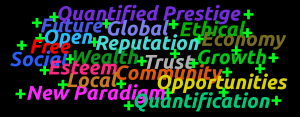
Hereby I pronounce that reputation economies will be the next big paradigm that furthers economic and societal progress. Why do I think that? Because I claim that reputation economies are a natural solution to a big economic problem that is increasingly explosive political issue: That of copyright and intellectual property. At least since the arrival of smartphones we have all the technological prerequisites to implement what I call formal reputation economies.
Why Reputation Economies?
There are two main reasons for considering reputation economies: First, making business more ethical, and secondly, resolving the copyright and IP issue in an optimal way. At least the first point should be intuitively plausible: If the economy is driven by reputation, then businesses have a strong incentive to behave in an ethical and not only in a legally admissible way, otherwise they would suffer severe economical losses, much more than in our current economic paradigm.
But how would a reputation economy solve the copyright and IP issue? And what is that issue after all? I call it the tragedy of the missing commons: Access to copyrighted material and intellectual property is restricted because these restrictions are seen by individual economic entities as economically rational, even though it would be much better for the economy as a whole if that material was in the public domain, as a part of the man-made commons. It is not hard to see why the whole economy would profit from free access to all kinds of digital goods, such as articles, books, software, music, movies, genes, and inventions. Open access to these goods can drive progress massively, because everyone can use the latest knowledge and tools. Also, digital goods could be public property, and their private or public usage wouldn’t even diminish the quality of these goods, as is often the case with physical goods. On the contrary, a culture of free copying and sharing accelerates innovation, because you don’t have to invent something from scratch, but can take something that’s already good and make it better.
If it doesn’t look like “free” stuff strengthens the economy, then that’s simply because we don’t measure the economy correctly. It is obviously better if everyone is wealthier by having free access to public goods than if only a select few have access to these goods. But scarcity, whether artificial or not, drives prices up, so the consumption of scarce goods is counted as positive entry in our current economic paradigm. And before you ask: No, I don’t know how to measure economic wealth correctly, sorry!
How would a reputation economy help to solve the tragedy of the missing commons? People could produce free digital goods and deliver services simply to get a better reputation. In a reputation economy a good reputation means wealth. There is no need for exclusiveness anymore. Everyone profits, except for those who had made a lot of cash with creating artificial scarcity. And creating artificial scarcity is getting more and more difficult anyway, because it’s getting increasingly easy to copy data, whether that’s legal or not.
What Is a Reputation Economy?
A simple albeit not very strict definition of a reputation economy is an economic system in which it suffices to have a good reputation in order to be wealthy. There is no absolute need for trade or work in the classical sense, even though they would still serve a useful purpose.
There is a connection between reputation economies and the ideal of meritocracy: Ideally, those who serve the public good should be rewarded for their actions. In a classical meritocracy this reward is money. Nevertheless, even in general the reward for serving the public good freely should be a good reputation. But only in a reputation economy does this good reputation translate into wealth. Thus, in the best case, a high reputation should be closely linked to a great service for the public good.
How Can Formal Reputation Economies Work?
In a formal reputation economy we don’t consider the informal reputation of persons, but a formalized version of that. More specifically, in a formal reputation economy there are metrics which are interpreted as some kind of formal reputation. We are talking more or less about the quantification of reputation. Think about Facebook “likes” or ratings on Amazon. Those are simple examples of the quantification of subjective esteem of certain things. These examples can be seen as simple reputation systems.
Reputation systems alone are not sufficient for having a real reputation economy. Let me explain an insight that stood at the beginning of the development of Quantified Prestige, the formal reputation economy system that I have developed. Why is money so attractive? Because the economy can be seen as a game. Money is simply a kind of universal “score”. If you “win”, your score rises, if you “lose”, your score drops. Now, if money is a score, why can’t we use other metrics as universal scores? Quantified reputation is exactly that: A universal score that can compete with classical forms of money.
Any reputation economy that is supposed to work, must meet some basic requirements.
- There is a quantified version of reputation, a reputation metric.
- The system avoids the inflation of reputation: If there are no sensible limits to generating reputation, the reputation metric will become worthless very quickly.
- User identification is reliable. This is necessary because if you count as two participants in a reputation economy, your reputation influencing power will also be doubled. Such multi-accounts would severely impede the significance of any reputation metric.
- Somehow the reputation metric must be linked to (the generation of) wealth. Otherwise you would only have a robust reputation system, and not a reputation economy.
There is a system that is able to meet all these requirements: Quantified Prestige.
How Does Quantified Prestige Handle These Requirements?
- First of all, Quantified Prestige is a software based formal reputation economy system. Anyone can register and join a Quantified Prestige Network (QPN). Users of a QPN can allocate Esteem Points (EPs) to other users. The main reputation metric of the system is called Prestige. How much Prestige you have depends on how much EPs you get from other users.
- Now, what prevents “Prestige inflation”? It’s the simple fact that every user has a permanent global quota of EPs (at the moment I’m favoring a quota of 12000) which he or she can allocate to others. Once allocated EPs must be taken back, and that is always possible, in order to allocate them to a different user. This prohibits Prestige inflation, unless users create very many active multi-accounts. Note that also a daily, weekly, monthly, or yearly quota of EPs would solve Prestige inflation, but having a global quota has some more or less subtle advantages.
- So, how is user identification handled? QP uses a Trust System that determines how “legitimate” a user account is. You can create very many multi-accounts, but unless they are trusted, they cannot contribute to the Prestige scores of other accounts. A very simplified formula is “Prestige = Esteem x Trust”. If Trust is 0, then no amount of EPs can generate any Prestige. How is Trust generated? This is a relatively complicated matter, so I won’t discuss that at this point. If you want to know the details, you can look them up in the Quantified Prestige Documentation.
- Finally, how is Prestige linked to wealth? There are basically two possible mechanisms: Distribution funds and internal currencies. Distribution funds are simply funds in any currency which are paid out regularly to the users of a QPN, in proportion to their Prestige scores. Internal currencies on the other hand can be directly created from the Prestige scores. I have developed an internal currency for QP that I call Fluido. It has some very neat and innovative features. The only downside to it is that it first needs to gain some public acceptance before it can become really useful.
Possible Use Cases of Quantified Prestige
There are basically two ways in which QP can be used: Locally or globally. Let’s look at some “local” use cases first:
Community Economies
In this first example, a community decides to adopt an internal reputation economy and installs a version of QP. The system has a double function as a reputation system, which is already useful in itself for various purposes, and as an internal economy. This internal economy can be used to distribute scarce resources within the community, for example the time and work of community members.
Company Economies
Companies could be seen as special communities. Typical companies have employees. QP could be used within the company in combination with a distribution fund in order to pay employees bonuses in proportion to their company-internal reputation, which optimally should correlate strongly with the quality and quantity of their work.
Expert Economies
A group of experts could decide to couple the mechanism of peer review with QP. Thus, good reviews would bring a lot of Prestige. And having a lot of Prestige could enable an expert to gain much more support from other experts.
A Global Reputation Economy
Finally, using a global QPN could enable a global reputation economy. There would be no restrictions to who is allowed to join the global QPN, because everyone is invited to participate in it. A global QP system would even have the potential to replace more traditional forms of economy. Any popular global reputation economy would possess a lot of power. Who will control this power? It would very well be possible that a global “QP Facebook” becomes a monopolist, but there a several problems to that. One one hand, this would constitute a great concentration of power, and on the other hand the global economy would be very vulnerable, because if that “QP Facebook” gets shut down, or decides to restrict its services in some way, the reputation economy would collapse quickly. Both problems can be avoided if the world uses a decentralized version of QP, so that the system rests in the hands (or rather computers) of everyone.
Considering all these advantages and possibilities it is clear that reputation economies have a huge potential. Quantified Prestige could actually become the basis of the economy of tomorrow. That is, unless someone develops a viable alternative system and develops it faster.
ShareNOV
2012




 Twitter
Twitter Facebook
Facebook GooglePlus
GooglePlus RSS
RSS